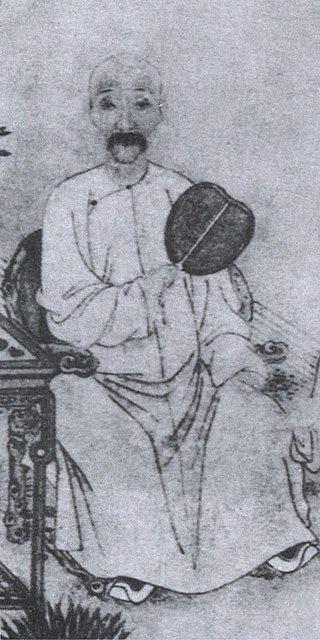Related Research Articles
Six Dynasties is a collective term for six Han-ruled Chinese dynasties that existed from the early 3rd century AD to the late 6th century AD, between the end of the Eastern Han dynasty and the beginning of the Sui dynasty. The Six Dynasties period overlapped with the era of the Sixteen Kingdoms, a chaotic warring period in northern China after the collapse of the Western Jin dynasty, as well as the Northern and Southern dynasties period. The terms "Wei, Jin, Southern and Northern dynasties" (魏晉南北朝) and "Three Kingdoms, Two Jins, Southern and Northern dynasties" (三國兩晉南北朝) are also used by Chinese historians to refer to the same historical era as the Six Dynasties, although the three terms do not refer to the same group of dynasties.

Hong Liangji, courtesy names Junzhi (君直) and Zhicun (稚存), was a Chinese scholar, statesman, political theorist, and philosopher. He was most famous for his critical essay to the Qianlong Emperor, which resulted in his banishment to Yili in Xinjiang. In modern times, he is best remembered for his essay Zhi Ping Pian on population growth and its sociopolitical consequence, in which he raised many of the same issues that were raised by Malthus writing during the same period in England.

Orville Hickock Schell III is an American sinologist. He is currently Arthur Ross Director of the Asia Society's Center on U.S.-China Relations. He previously served as dean of the University of California, Berkeley's Graduate School of Journalism.
Thomas A. Metzger is a senior fellow at Stanford University's Hoover Institution. He is the son of the German philosopher Arnold Metzger (1892–1974). He specializes in the intellectual and institutional history of China, studying both the premodern and modern periods. His current research focuses on contemporary China's moral-political discourse and its historical roots, dealing with both China and Taiwan. He also has written on U.S.–China policy issues and has lectured widely in English and Chinese in the United States, Europe, Taiwan, China, and Hong Kong.
Frederic Evans Wakeman Jr. was an American scholar of East Asian history and Professor of History at University of California, Berkeley. He served as president of the American Historical Association and of the Social Science Research Council. Jonathan D. Spence said of Wakeman that he was an evocative writer who chose, "like the novelist he really wanted to be, stories that split into different currents and swept the reader along", adding that he was "quite simply the best modern Chinese historian of the last 30 years".
Elizabeth J. Perry, FBA is an American political scientist specialized in Chinese politics and history. She currently is the Henry Rosovsky Professor of Government at Harvard University. She is a fellow of the American Academy of Arts and Sciences, a corresponding fellow of the British Academy, a recipient of a Guggenheim Fellowship, and served as Director of Harvard's Fairbank Center for East Asian Research from 1999 to 2003 and as president of the Association for Asian Studies in 2007.
The Weatherhead East Asian Institute (WEAI) at Columbia University is a community of scholars affiliated with Columbia's schools, bringing together over 50 full-time faculty, a diverse group of visiting scholars and professionals, and students from the United States and abroad. Its mission is to train new generations of experts on East Asian topics in the humanities, social sciences, and the professions and to enhance understanding of East Asia in the wider community. Since its establishment in 1949 as the East Asian Institute, the WEAI has been the center for modern and contemporary East Asia research, studies, and publication at Columbia, covering China, Japan, Taiwan, Hong Kong, Korea, Mongolia, Tibet, and, increasingly, the countries of Southeast Asia.
David Der-wei Wang is a literary historian, critic, and the Edward C. Henderson Professor of Chinese Literature at Harvard University. He has written extensively on post-late Qing Chinese fiction, comparative literary theory, colonial and modern Taiwanese literature, diasporic literature, Chinese Malay literature, Sinophone literature, and Chinese intellectuals and artists in the 20th century. His notions such as "repressed modernities", "post-loyalism", and "modern lyrical tradition" are instrumental and widely discussed in the field of Chinese literary studies.
A comprador or compradore is a "person who acts as an agent for foreign organizations engaged in investment, trade, or economic or political exploitation." An example of a comprador would be a native manager for a European business house in East and South East Asia, and, by extension, social groups that play broadly similar roles in other parts of the world.
Mark C. Elliott is the Mark Schwartz Professor of Chinese and Inner Asian History at Harvard University, where he is Vice Provost for International Affairs. He is also a seminal figure of the school called the New Qing History.
The Imperial Clan Court or Court of the Imperial Clan was an institution responsible for all matters pertaining to the imperial family under the Ming and Qing dynasties of imperial China. This institution also existed under the Nguyễn dynasty of Vietnam where it managed matters pertaining to the Nguyễn Phúc clan.
Albert Feuerwerker was a historian of modern China specializing in economic history and long time member of the University of Michigan faculty. He was the president of the Association for Asian Studies in 1991.

Joshua A. Fogel is an American-Canadian Sinologist, historian, and translator who specializes in the history of modern China, especially focusing on the cultural and political relations between China and Japan. Before retiring and becoming professor emeritus in 2024, he held a Tier 1 Canada Research Chair at York University in Toronto from 2005. Before that he taught at Harvard University (1981–1988) and the University of California, Santa Barbara (1989–2005). He is a fellow of the Royal Society of Canada.

Robert Barnett is a Professorial Research Associate at SOAS, University of London and Affiliate Lecturer and Research Affiliate at the Lau China Institute, King's College, London. He is the former Director of the Modern Tibetan Studies Program, where he was Adjunct Professor of Contemporary Tibetan Studies and Senior Research Scholar in modern Tibetan history at the Weatherhead East Asian Institute at Columbia University. He retired from Columbia as of January 2018. He is also referred to as Robbie Barnett by the media.
Evelyn Sakakida Rawski is an American scholar of Chinese and Inner Asian history. She is currently a Distinguished University Professor in the Department of History of the University of Pittsburgh. She was born in Honolulu, Hawaii, United States of Japanese-American ancestry. She served as president of the Association for Asian Studies in 1995–1996.
William Townsend Rowe is a historian of China, and John and Diane Cooke Professor of Chinese History, Department of History, Johns Hopkins University. He considers himself a social historian of modern China, with both "social" and "modern" very broadly conceived, and works on every century from the 14th to the 20th.
This bibliography covers the English language scholarship of major studies in Chinese history.
Andrew G. Walder is an American political sociologist specializing in the study of Chinese society. He has taught at Harvard University and Stanford University, where he joined the faculty in 1997 and is the Denise O'Leary & Kent Thiry Professor of the School of Humanities and Sciences, and a Senior Fellow of the Freeman-Spogli Institute for International Studies at Stanford University.
Liu Kwang-ching, who sometimes published under the name K.C. Liu, was a Chinese-born American historian of China. He taught at University of California-Davis from 1963 until his retirement in 1993. He is best known for his scholarship in late-Qing history, astute bibliographical work, and edited volumes, including co-editing Cambridge History of China volumes.
Thomas Shawn Mullaney is an American sinologist. He is a Guggenheim fellow. He is professor of history at Stanford University, working on technology, race, and ethnicity in China.
References
- 1 2 WEAI: Zelin
- ↑ Mullaney, Thomas (2011). Coming to Terms with the Nation: Ethnic Classification in Modern China. University of California Press. pp. xxi.
- ↑ Mullaney, Thomas (2006). Coming to Terms with the Nation: ethnic classification and scientific statecraft in modern China, 1928-1954 (Thesis).